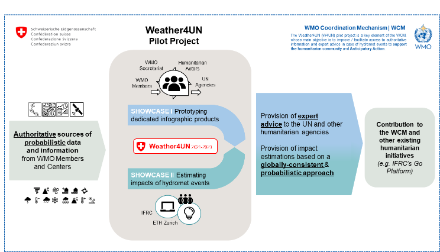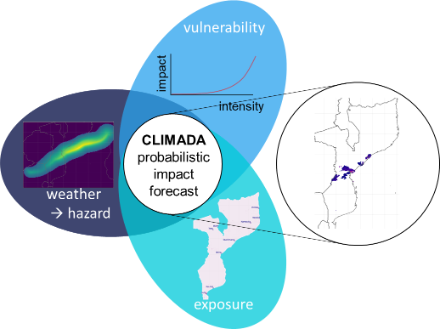Service Navigation
Search

The vast majority of disasters triggered by natural hazards leading to humanitarian crises are caused by extreme weather- and climate-related events (IFRC). Between 1970 and 2019, there were more than 11’000 disasters attributed to weather, climate and water-related hazards, resulting in over 2 million deaths and 3.64 trillion US dollars in losses (2021 WMO Atlas of Mortality and Economic Losses from Weather, Climate and Water Extremes). To further reduce the impacts of these hydrometeorological events, it is increasingly crucial that humanitarian organizations act before crises (to take anticipatory actions) and not “only” after the events (in response to the events).
The World Meteorological Organization (WMO), the UN and Humanitarian agencies have long recognized the vital importance of reliable and timely hydrometeorological information to support Anticipatory Action and Response and as such have been working in partnership for many years to address the specific needs. However, all stakeholders agree that more is to be done to harness this rich seam of crucial information. Therefore, at Congress 2019 WMO Members endorsed a key resolution which will enhance the provision of information still further through what will become the WMO Coordination Mechanism (WCM).
In April 2020, the Swiss Federal Council decided to contribute to the development of this mechanism through the Weather4UN project. MeteoSwiss implements this project in close collaboration with the Swiss agency for Development and Cooperation (SDC) and WMO and its Members as well as the humanitarian community.
Weather4UN – a snapshot
Weather4UN consists of two main components (showcases). The first one aims to improve access to high value information and the second aims to assess the impacts of hydrometeorological events. Both showcases seek to rely on authoritative products and to develop a globally consistent approach.

The first part of the project aims to establish a prototype of a Global HydroMet Scanning Capability that enables the provision of the hydromet information and expert advice to the Humanitarian Actors (HA), demonstrating WMO’s capability to support and inform Anticipatory Action. Using human expertise (“Watchkeeper”) and semi-automatic systems, the authoritative weather and climate existing information from WMO Members, WMO Regional Climate Centres, etc. is collected, analysed and compiled, providing added-value advice. This information is then distributed to the HA through different products and tools (prototypes) specifically tailored to best meet their needs. This part of the project is developed in close collaboration with the WMO Secretariat in Geneva.

The second part of the project focuses on the development of a tool to estimate the combined risks and impacts of forecasted natural hazards. Based on a globally consistent probabilistic risk model (CLIMADA) coupled with probabilistic weather forecasts from WMO Member countries and territories, the estimation of multi-hazard impacts will enable humanitarian actors to plan and anticipate the best responses to protect the most vulnerable populations.
This part of the project is developed in close collaboration with Prof. D. N. Bresch (Weather and Climate Risks), ETH Zurich and MeteoSwiss) and the International Federation of Red Cross and Red Crescent Societies (IFRC).

Illustration adapted from Röösli et al. 2021
Ultimately, the Weather4UN project will inform and contribute to the development of the WCM. The project already successfully supported the creation of the WCM Implementation Plan, which has been discussed in several WMO workings groups (e.g. the Expert Team WCM group and the Standing Committee on Disaster Risk Reduction and Public Services group) and has finally been approved by the WMO Executive Council in March 2023.
Thus the Executive Council agreed to further enhance the support WMO provides to UN humanitarian agencies. The WCM will ensure that they have access to authoritative data, information and expert advice. It also supports the Early Warning for All Initiative launched at COP27 (https://public.wmo.int/en/media/press-release/early-warnings-all-action-plan-unveiled-cop27) by the UN Secretary-General Antonio Guterres in Egypt.
MeteoSwiss continues its support the implementation of the WCM through the Weather4UN pilot project.
Contact: weather4un@meteoswiss.ch